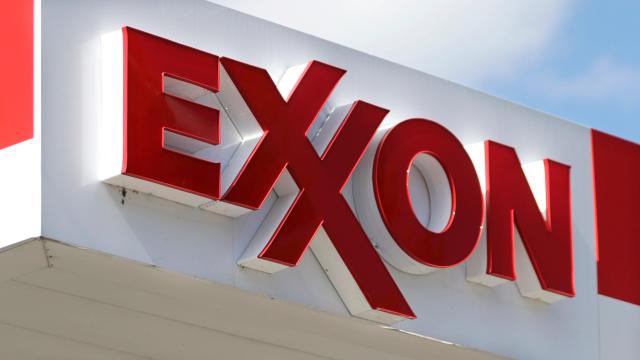Seems like Big Oil’s chickens may be coming home to roost. On Friday, the Climate Leadership Council, a bipartisan, industry-supported group that advocates for centrist climate solutions, announced that former founding member ExxonMobil had been kicked out. The move follows a Greenpeace exposé that caught an Exxon lobbyist on tape admitting that the company’s endorsement of a carbon tax — a key policy the CLC advocates for — was nothing more than a “great talking point” for the company.
The CLC made a grand entrance into the climate conversation in 2017 with a full-page ad in the Wall Street Journal touting how its solution could create a “much-needed bipartisan climate breakthrough.” The membership of the CLC was always its calling card: the group has positioned itself as a middle-of-the-road, business-first coalition, united together to propose Sensible Solutions that would appeal to conservatives and Republicans. The group boasted four Republican statesmen who served under Reagan and both Bush administrations as authors on its climate strategy, while its corporate founding members run the gamut from Johnson & Johnson to IBM to Goldman Sachs. (Exxon wasn’t the only oil company in the mix: Shell, BP, Total and ConocoPhillips are also listed as founding members on the group’s page.)
The grand centrepiece of the CLC’s plan has always been a carbon tax, which has long been thought of as one of the most barebones, obvious pieces of climate legislation: Make emitters pay for their pollution to encourage them to do less of it. Unfortunately for Exxon, a Greenpeace-affiliated investigation published last month caught one of its senior government relations officials admitting on tape that the company’s endorsement of a carbon tax was little more than an “an advocacy tool” to make sure Exxon looks good in the public eye.
“Nobody is going to propose a tax on all Americans, and the cynical side of me says, yeah, we kind of know that, but it gives us a talking point that we can say, ‘well what is ExxonMobil for, we’re for a carbon tax,’” Keith McCoy, Exxon’s senior director of federal relations, said in the tape Channel 4 aired last month.
“After careful consideration, we have decided to suspend ExxonMobil’s membership in both the Council and Americans for Carbon Dividends, our advocacy arm,” CLC CEO Greg Bertelsen said in a statement on Friday. “We continue to believe that we will establish lasting climate solutions by bringing together a broad and diverse group of stakeholders who can work together to address this enormous challenge.”
In an email sent to Bloomberg News, Exxon called CLC’s decision “disappointing and counterproductive,” and said the move “will in no way deter our efforts to advance carbon pricing that we believe is a critical policy requirement to tackle climate change.”
In recent years, more oil companies have gotten on board with the idea of passing a carbon tax. The oil and gas industry’s main lobbying arm, the American Petroleum Institute, said earlier this year that they were now in favour of a tax on carbon.
There’s always been a complex layer of doubt and showmanship around the idea of Big Oil being on board with this particular policy. Even though a carbon tax is a very basic principle, it’s failed spectacularly at even getting off the ground in Washington: The last time it was even introduced as a piece of legislation was the 2009 Waxman-Markey bill, which died in the Senate following GOP opposition. After decades of organisations like Exxon, Shell, and API directly lobbying against climate policies (including the Waxman-Markey bill), promoting climate denial, and lining the pockets of politicians, their about-face on this one idea doesn’t say much. In fact, they’ve created a political climate where a bare-minimum climate policy like a carbon tax will have an enormous uphill battle to even be considered. McCoy’s leaked comments that the company didn’t think a carbon tax would ever happen just confirmed what we suspected all along: that Big Oil is searching for empty gestures that will make them look good but not actually change the status quo. (In this light, Exxon’s announcement last week that it’s mulling over a net-zero target certainly deserves extra scrutiny.)
Exxon may be out of the Climate Leadership Council, but plenty of oily companies — as well as firms that work with fossil fuel companies on extraction, like Microsoft — are still in the group. It remains to be seen whether or not those companies will put their money where their mouth is and actually work for solutions.
